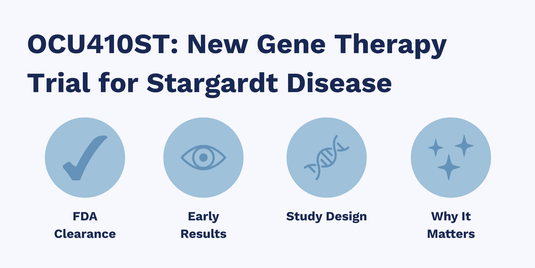At A Race Against Blindness, we’re always following scientific breakthroughs that bring hope to families affected by rare retinal diseases. One of the most exciting recent updates comes from Ocugen, Inc., a biotechnology company developing cutting-edge gene therapies.
On June 16, 2025, Ocugen announced that the U.S. Food and Drug Administration (FDA) has cleared them to begin a Phase 2/3 pivotal confirmatory trial of OCU410ST, their modifier gene therapy candidate for Stargardt disease. This is a major step toward a potential treatment for a condition that currently has no approved therapies.
What Makes OCU410ST Different
Unlike traditional gene therapy approaches that target single mutations, OCU410ST uses Ocugen’s modifier gene therapy platform. This approach delivers the RORA gene, which regulates multiple disease pathways linked to Stargardt disease, including:
-
Lipofuscin buildup
-
Oxidative stress
-
Inflammation
-
Cell survival
Because it targets broad disease mechanisms, OCU410ST may help a wide range of patients, even though Stargardt and related ABCA4-retinopathies involve over 1,200 known mutations.
Promising Early Results (Phase 1 GARDian Trial)
OCU410ST has already shown encouraging outcomes in earlier testing:
-
Strong safety profile — no serious adverse events reported
-
Slower disease progression — treated eyes showed 48% slower lesion growth at 12 months compared to untreated eyes
-
Better vision outcomes — patients gained nearly 2 lines of vision on an eye chart (BCVA) at 12 months
The Phase 2/3 Trial
The newly approved pivotal trial will enroll 51 participants with Stargardt disease:
-
34 patients will receive a one-time subretinal injection of OCU410ST in their weaker eye
-
17 patients will serve as an untreated control group
Study Goals
-
Primary endpoint: Reduction in atrophic lesion size
-
Secondary endpoints: Improvements in best corrected visual acuity (BCVA) and low luminance visual acuity (LLVA)
Results from this study will be used to support Ocugen’s planned Biologics License Application (BLA) with the FDA, expected in 2027.
Why This Matters
Stargardt disease is the most common form of inherited macular degeneration, affecting nearly 100,000 people in the U.S. and Europe and over 1 million worldwide. For families living with this condition, where central vision progressively declines and no treatment options exist, news like this represents real hope.
Dr. Huma Qamar, Chief Medical Officer at Ocugen, called the trial’s launch a “significant milestone” for families desperate for solutions. And with the FDA already granting Rare Pediatric Disease and Orphan Drug Designations, there is clear recognition of the urgent need.
Looking Ahead
If successful, OCU410ST could become one of the first approved therapies for Stargardt disease — and potentially change the landscape of treatment for inherited retinal diseases.
At A Race Against Blindness, we’ll be following Ocugen’s progress closely and sharing updates as the trial unfolds. Each step forward brings us closer to a future where families facing blindness can look forward with hope.
✅ Sources:
-
Ocugen Press Release: Ocugen.com



